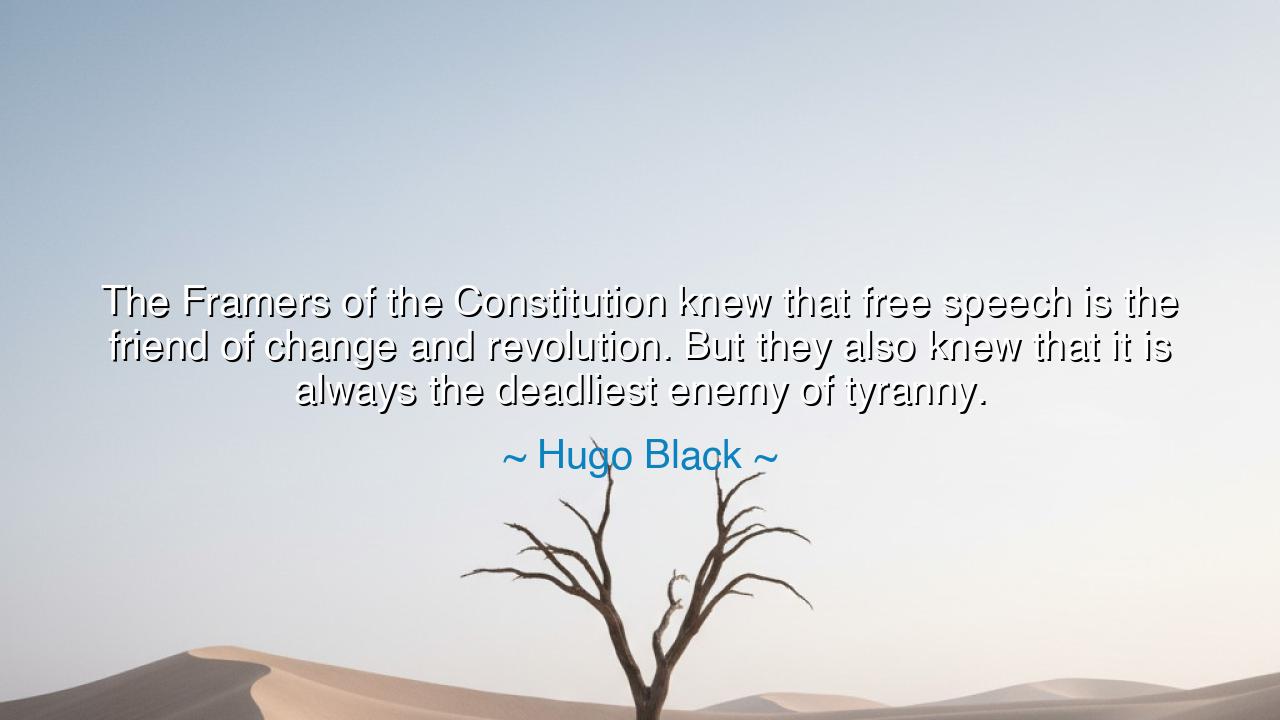
The Framers of the Constitution knew that free speech is the
The Framers of the Constitution knew that free speech is the friend of change and revolution. But they also knew that it is always the deadliest enemy of tyranny.






Host: The room was quiet, the soft hum of the evening outside fading into stillness. Jack sat at the table, his cup of tea resting lightly in front of him, his fingers tracing the edge of the cup. Jeeny stood near the window, her gaze fixed on the darkening street, absorbed in the weight of Hugo Black's words.
Jeeny: “I’ve been thinking about what Hugo Black said: ‘The Framers of the Constitution knew that free speech is the friend of change and revolution. But they also knew that it is always the deadliest enemy of tyranny.’ It’s such a profound statement, isn’t it? The idea that free speech is not just a tool for expression, but a weapon against oppression and control.”
Jack: “Yes, it really speaks to the fundamental role that free speech plays in shaping a just society. Black is pointing out that the framers of the Constitution understood the power of speech—not just as a right, but as a counterbalance to tyranny. When people can speak freely, they can challenge power, bring about change, and hold those in control accountable. But when free speech is suppressed, it leaves room for tyranny to take root.”
Jeeny: “Exactly. Free speech allows people to question, to dissent, to raise their voices against injustice. When speech is restricted, people become silenced, and that’s when power can be abused without checks. The Framers recognized that allowing for free expression was not just about the right to speak—it was about ensuring that individuals had the ability to challenge authority and protect the freedoms they held dear.”
Host: The quiet in the room deepened, the weight of Black’s words settling in as they both reflected on the delicate balance between freedom and control. Jack’s fingers gently rested on the table, his thoughts turning inward as he considered the role that speech has played in shaping the world, both historically and in the present.
Jack: “It’s almost like Black is showing us that freedom isn’t just a privilege—it’s a responsibility. The ability to speak freely means we have a duty to speak up when we see something wrong, when we see tyranny or injustice. If we don’t, then we allow that power to grow unchecked. Free speech isn’t just about individual rights; it’s about preserving the health of society itself.”
Jeeny: “Yes, and I think that’s why tyrants fear free speech so much. It’s not just about words—it’s about ideas, about empowering people to think critically and to resist. Black is pointing out that free speech is the foundation of democracy and change. Without it, we’re left with silence, and in silence, power can become dangerous.”
Jack: “Exactly. And I think that’s why the Framers of the Constitution placed such importance on free speech. They knew that if people couldn’t speak out, if their voices were suppressed, then they couldn’t protect themselves from tyranny. Free speech is what allows democracy to thrive, because it gives the people the power to bring about change, to challenge leaders, and to make sure their rights aren’t trampled.”
Jeeny: “Right, and it’s not just about speaking—it’s about being heard. When speech is allowed to flow freely, it creates a culture of accountability, where people are constantly questioning and challenging, and where those in power are held responsible. But when speech is stifled, we risk living in a world where people are too afraid to speak out, too afraid to question what’s happening around them.”
Host: The room had grown even quieter now, the weight of their conversation settling into a deeper reflection on the role of free speech in preserving freedom and preventing tyranny. Hugo Black’s words had sparked an understanding that free speech is not just about expressing opinions—it is a critical safeguard against the abuse of power and a cornerstone of a healthy, dynamic society. Jack leaned back in his chair, his fingers gently resting on the edge of the table, while Jeeny’s expression softened, reflecting on the responsibility that comes with the freedom to speak.
Jack: “I think the key takeaway is that free speech is not a luxury we should take for granted. It’s essential for the functioning of a just society. If we don’t speak out, we allow oppression to take root. It’s not just about having the right to speak—it’s about ensuring that all voices are heard, especially when those voices challenge the status quo.”
Jeeny: “Yes. Free speech isn’t just about what we say—it’s about the freedom to question, to disagree, to bring about change. Black reminds us that, without this freedom, we risk losing everything that makes us democratic. The right to speak is essential for holding power accountable and ensuring that we don’t slip into a world of unchecked authority.”
Host: The evening had fully settled in, their conversation leaving behind a quiet realization that free speech is not only a fundamental right, but also a necessary tool for change and resistance. Hugo Black’s words had reminded them both that freedom of speech is not just an individual right—it is a societal safeguard against tyranny, a way for people to challenge authority, protect their rights, and preserve the very foundations of a free and democratic society. The world outside had darkened, but inside, there was light—a recognition that speech is a powerful force, one that shapes our society and keeps it healthy, accountable, and free.






AAdministratorAdministrator
Welcome, honored guests. Please leave a comment, we will respond soon